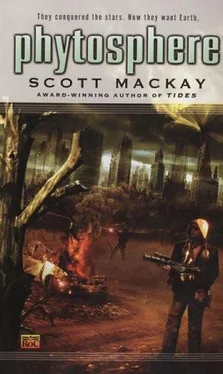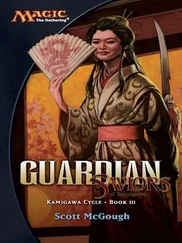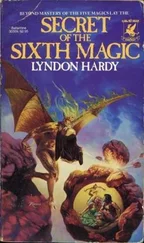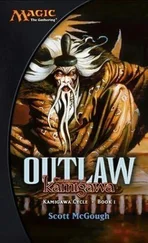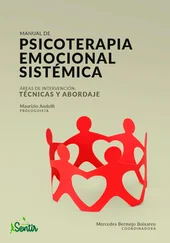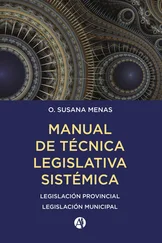But then she got a nosebleed.
And shortly after her nose bled, she died.
He didn’t immediately feel the overwhelming grief he knew he would later feel. He just felt…disappointed. Disappointed that all the plans they had made for their sunset years were coming to nothing.
“Is she all right?” Morgan kept asking.
“No, sweetie,” he said. “She’s not all right. She’s dead.”
He said the words slowly because he felt he always had to say things slowly for Morgan, just to make sure she understood.
Morgan was not, as Lenny might have said, a combat asset after that, because she simply clung to her mother, crying and crying, occasionally trying to wake her mother up as if she still didn’t understand that Louise was dead.
His initial disappointment faded, and was replaced by a…a knowledge and certainty that he had nothing left to live for, except…except as Louise’s avenger.
He lifted Louise’s Montclair from the floor and checked the little electronic monitor on the side. Two hundred seventy-two rounds left. His own weapon had 234 left. Armed with two weapons, one in each hand, their butts pressed against his biceps, he stood up like a thriller-action hero, heedless of whether any more VMs were coming, and fired away. Through his light-gathering goggles, he saw the alien bastards moving through the dead forest and, in the nanoseconds it took him to squeeze both triggers, he had a memory of Louise out there in the woods picking wildflowers; because that’s what she did when she came here, picked wildflowers, put them in a vase, and tried, with varying degrees of success, to paint them with watercolors.
Every fifth round was a tracer, and the ammo arced over the grounds like hot little hornets in the light-gathering lenses of his goggles. He killed one of the alien bastards, and then another, and finally a third, and saw the remaining two scatter into the woods, their bodies like human bodies, but the proportions different so that the arms were too long and the legs too short; yes, alien bodies, human parodies, and they all deserved to die now that they had taken away his sweet Louise.
He fired until he stopped feeling the kick from his weapons. And shortly after that he realized it was extremely quiet. He looked down at Louise. Morgan wasn’t there anymore. He took a deep breath.
What was he going to do now? We’re going to be all right. People with money are going to weather this thing just fine. His words came back to haunt him. Was it a character flaw, the hubris he had felt all his life? So that he had even believed he was immune to the Apocalypse?
He dropped the Montclairs to the floor. Their barrels smoked. He was hot. Drenched in sweat. He collapsed to his knees. His eyes moistened, yet the guttural howl that tried to escape from his throat simply wouldn’t come, especially not now, not when Morgan came back into the room with the other girls. He knew he had to keep it in, make his girls understand in a calm, reasonable way that things like this happened in the Apocalypse; children lost parents and parents lost children.
Ashley came to him. Melissa came to him. And Melissa was still clutching her Montclair, as if she had forgotten she had it in her hand. They cried, but they didn’t wail—the Thorndike family wasn’t given to excessive displays of emotion—but in their quiet sobs he felt an especially keen agony, something that seemed to grab all his internal organs and drag them downward. Here was the family, what was left of it, the two older girls clinging to him while Morgan fussed around Louise like the strange child she was, trying to wake Louise up.
“Morgan, come here.”
When Morgan came to him, he clung to her tightly, because Louise had always been so worried about Morgan, and Morgan always needed a lot of support, and yet it was now Morgan, a ten-year-old girl, who stroked his hair, even as his own tears came faster, and said to him, “It’s okay, Daddy. It’s okay.”
She showed a strength that surprised him. Portrait of a family in great grief. With only the father left now.
And that was the worst of all possible situations because he wasn’t sure he knew how to be a father. He had always been a professor and a scientist, too focused on his career, and hadn’t even really watched his kids grow up.
He heard combat boots coming along the hall. He looked up. Lenny stared at him in the light coming from the communications apparatus. Lenny had a scratch on his face, not a deep one, but still angry and red. The airman glanced at Louise, then back at Neil.
Neil said, “Sorry. I tried.”
And Lenny responded by saying, “They got Douglas and Sinclair.”
“How long before they try again?”
“Who knows?”
“There’s a cave,” he volunteered. “Did you find the cave? It’s all limestone along this ridge.”
Lenny’s eyes narrowed. “Like for a fallback position?”
“The VMs will have a tough time.”
“What about your sister-in-law? If we go up there…”
And thinking of Glenda, he felt a great comfort. “She’ll figure it out. But maybe we should…maybe I should show you where this cave is…”
He lost sight of that particular objective over the coming days.
They buried Louise. Out by the pool next to the others. They wrapped her in a sheet, and put some photographs of the kids in with her, and also one of her watercolors, and Lenny said something about her even though he didn’t know her, the usual things: good mother, good wife, all-around decent person, and, god-damn it, they would make the Tarsalans pay for this. This last bit came in a sudden outburst that shook Lenny’s body from head to toe.
What was so strange about it was the heat, over a hundred and ten degrees, as if after triggering a short nuclear winter the phytosphere was now rebounding with a long and lethal summer, true to his prediction, even though they were well into October now.
And when Fernandes and Rostov broke the earth, it was like dust, as moistureless as talc, so that it blew away into the tinder-dry forest in little brown puffs, like so many fleeing ghosts.
Gerry stood next to the comlink in the mayor’s office. Around him were Ian, Mitch, Ira, Stephanie, and the mayor’s assistant, Damian. Hulke sat in front of the comlink, his face masked in his usual self-immolating grin. On the monitor Gerry saw Kafis’s face and, in the background, he caught a glimpse of another Tarsalan, this one checking something on another screen. It was this other Tarsalan that bothered Gerry. What was he doing? What was he checking? Was it game over for their little conspiracy, even before it had properly begun?
“Council has voted to accept your…uh…solution,” said Hulke, with not even the slightest quaver in his voice, as if his nerve had been hardened by years at the blackjack table. “We would like to invite you and your entire delegation to a celebration dinner in the Nectaris Council Chamber tonight at eight. My advisors and I think our new partnership should be marked in a special way, and so we’re bringing out of stores the finest cuisine still left in our inventory—I should tell you, Kafis, that the cuisine on the Moon is world-renowned. We of course expect you to make a speech, and I myself will make a speech as well.”
“You’ve taken an excellent first positive step, Mayor. My delegation will be eager to meet with your people. The Moon has turned a new page in its history.”
“I couldn’t agree with you more, Kafis.”
The communication ended. The mayor turned to Gerry. “How was that?”
“What was that other one doing in the background?”
“I imagine he was there to stop me from reading Kafis too easily. It’s an old poker trick. Always have people in the background for distraction purposes. That’s why I had Damian right next me.”
Читать дальше
